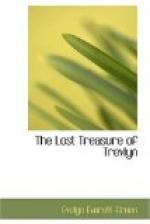“Hast come to help us with the pie, Cherry?” asked Jemima kindly. “There, then, take my place with the paste; ’tis almost ready, but would do with a trifle more beating. And there be fowls to draw and get ready for the oven, and I know thou lovest not such a task.”
Cherry shuddered at the thought, and gladly took Jemima’s place, tasting the almond with an air of relish, and going about her tasks with a dainty air that would have angered Aunt Susan, but which honest Keziah regarded with admiration.
“How many be coming to supper tonight?” asked Cherry. “Is it to be a gathering?”
“Nay, I scarce know. I have only heard what aunt said to thee. Father spoke of guests without saying the number, and she said our uncle would be there, and Master Anthony Cole and his son. Whether there be any others I know not; belike Rachel and Jacob may come too.”
“Now I am sore puzzled anent this Anthony Cole,” said Cherry, as she beat her paste and leaned towards Keziah, so that her voice might not carry as far as the kitchen.
“And wherefore art thou puzzled, child?”
“Marry, because it was but a short while ago that we were forbid even to speak with him or any in his house, neighbours though we be; and now he comes oft, and father gives him good welcome, and bids him to sup with us. It fairly perplexes me to know why.”
Keziah also lowered her voice as she replied:
“We were forbid his house because that he and his household be all Papists.”
“Ay, verily, that I know. But they be none the less Papists now, and yet we give them good day when we meet, and sit at the same board with them in all amity. Are they turning Protestant then, or what?”
Keziah shook her head.
“It is not that,” she said.
Nay, then, what is it?”
“Marry, methinks it is that we are companions in distress, and that a common trouble draws us the closer together. Thou must have heard—”
“Oh, I hear words, words, words! but I heed them not. It is like eating dust and ashes.”
“Nay, thou art but a child, and these things are not for children,” answered Keziah, indulgently. “And, indeed, they are hard to be understood, save by the wise and learned. But this much I gather: When the King came to the throne, all men hoped for better days—liberty to think each according to his conscience, liberty each to follow his own priest or pastor, and join without fear in his own form of worship. The Papists believed that the son of Mary Stuart would scarce show severity to them. The Puritans were assured that one bred up by the Presbyterians of Scotland would surely incline to their ways of worship and thought. But the King has disappointed both, and has allied himself heart and soul with the Episcopal faction and the Church of the Establishment; and, not content with that, is striving to enforce the penal statutes against all who do not conform as they were never enforced in the Queen’s time. Wherefore, as thou mayest understand, the Papists and the Puritans alike suffer, and so suffering are something drawn together as friends, albeit in doctrine they are wide asunder—wider than we from the Establishment or they from it. But trouble drives even foes to make common cause sometimes.”




